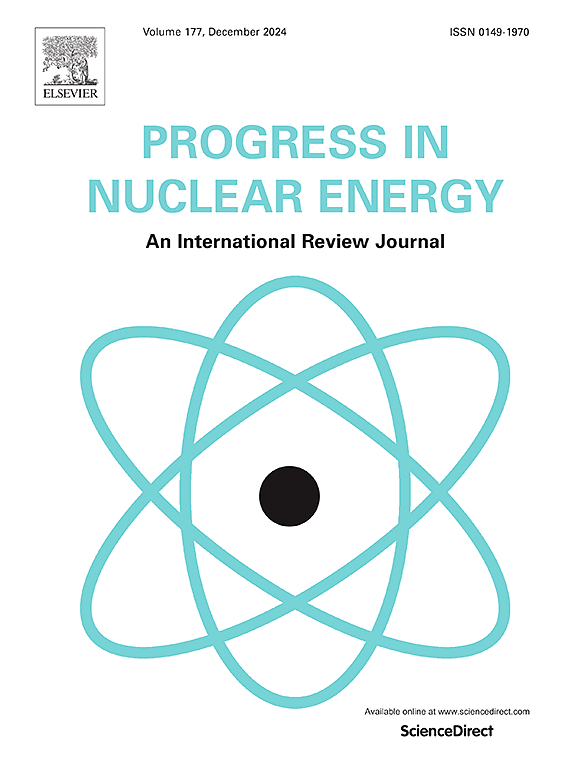热离子空间反应堆 TOPAZ-II 的增益调度非线性级联控制和启动控制策略研究
IF 3.3
3区 工程技术
Q1 NUCLEAR SCIENCE & TECHNOLOGY
引用次数: 0
摘要
前苏联设计的 TOPAZ-II 热离子空间反应堆系统具有高度非线性和正温度反应反馈的特点。热离子空间反应堆在控制其电功率和出口温度方面具有高惯性和显著延迟的特点。简单的 PID 控制器难以实现良好的性能。为了进行热离子空间堆的控制器设计,本研究基于反应堆系统热-液压代码 RESYS 和控制系统模拟器的耦合,开发了热离子空间堆的模拟平台。然后,基于级联控制策略和增益调度,利用传递函数模型和频域分析方法设计了适用于全功率范围的反应堆热控制器、电功率控制器和出口温度控制器。为了验证非线性电力控制器的性能,模拟了电力设定点的连续小阶跃扰动、大阶跃扰动和斜坡变化。出口温度控制器的性能通过出口温度设定点的阶跃和斜坡变化仿真结果得到验证。随后,对热离子空间反应堆 TOPAZ-II 的启动过程进行了模拟和分析。仿真结果表明,本文设计的控制器能克服热离子空间堆系统的非线性问题,在整个功率范围内性能良好。与传统的简单 PID 控制器相比,级联控制器具有更好的性能,即使在简单 PID 控制器无法正常工作的情况下也能实现良好的控制性能。本文章由计算机程序翻译,如有差异,请以英文原文为准。
Non-linear cascade control with gain-scheduling and startup control strategy study for thermionic space reactor TOPAZ-II
The TOPAZ-II thermionic space reactor system, which was designed by the Soviet Union, is characterized by its high degree of nonlinearity and positive temperature reactivity feedback. The thermionic space reactor exhibits characteristics of high inertia and significant delay in controlling its electrical power and outlet temperature. The simple PID controller is difficult to achieve good performance. To carry out controller design for thermionic space reactor, the simulation platform for thermionic space reactor is developed based on coupling between reactor system thermal-hydraulic code RESYS and control system simulator in this study. After that, based on the cascade control strategy and gain-scheduling, the reactor thermal controller, electric power controller, outlet temperature controller applicable for the full power range is designed with transfer function model and frequency domain analysis method. To validate the nonlinear electric power controller performance, the continuous minor step disturbances, major step disturbances, and ramp variation of electric power setpoint is simulated. The performance of outlet temperature controller is verified with the simulation result of step and ramp variation of outlet temperature setpoint. Thereafter, the start-up process of the thermionic space reactor TOPAZ-II is simulated and analyzed. The simulation result reveals that the controller designed in this paper can overcome the nonlinearity of the thermionic space reactor system and has good performance throughout the entire power range. Compared to traditional simple PID controller, the cascade controller has better performance and can achieve good control performance even in situations where simple PID controllers cannot function properly.
求助全文
通过发布文献求助,成功后即可免费获取论文全文。
去求助
来源期刊

Progress in Nuclear Energy
工程技术-核科学技术
CiteScore
5.30
自引率
14.80%
发文量
331
审稿时长
3.5 months
期刊介绍:
Progress in Nuclear Energy is an international review journal covering all aspects of nuclear science and engineering. In keeping with the maturity of nuclear power, articles on safety, siting and environmental problems are encouraged, as are those associated with economics and fuel management. However, basic physics and engineering will remain an important aspect of the editorial policy. Articles published are either of a review nature or present new material in more depth. They are aimed at researchers and technically-oriented managers working in the nuclear energy field.
Please note the following:
1) PNE seeks high quality research papers which are medium to long in length. Short research papers should be submitted to the journal Annals in Nuclear Energy.
2) PNE reserves the right to reject papers which are based solely on routine application of computer codes used to produce reactor designs or explain existing reactor phenomena. Such papers, although worthy, are best left as laboratory reports whereas Progress in Nuclear Energy seeks papers of originality, which are archival in nature, in the fields of mathematical and experimental nuclear technology, including fission, fusion (blanket physics, radiation damage), safety, materials aspects, economics, etc.
3) Review papers, which may occasionally be invited, are particularly sought by the journal in these fields.
 求助内容:
求助内容: 应助结果提醒方式:
应助结果提醒方式:


